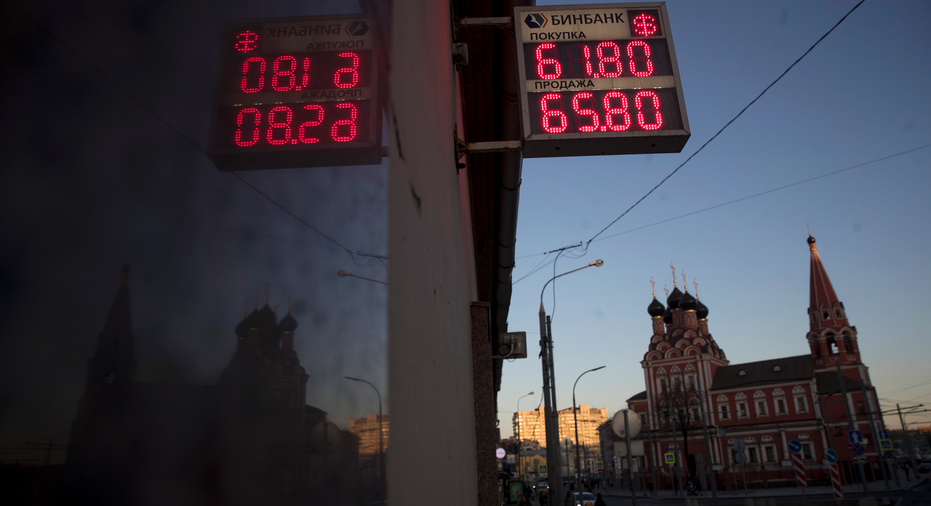Russian ruble roiled by Trump missile threat, US sanctions

MOSCOW – The Russian ruble fell and then recovered ground Wednesday after being shaken by U.S. sanctions and President Donald Trump's threatened missile strike on Syria.
The ruble fell 2 percent against the dollar in morning trading in Moscow and dropped to its lowest point since 2016 after Trump tweeted that missiles "will be coming."
However, the currency bounced back and by evening traded slightly down on the day at 62.8 to the dollar.
The euro traded at around 77.7 in the early evening after going above 80 earlier in the day.
U.S. sanctions imposed Friday barred U.S. citizens from doing business with numerous Russian businessmen, officials and companies, and froze any assets they may have in U.S. jurisdiction.
Russian markets have been spooked not only by the impact on sanctioned companies such as aluminum producer Rusal, but also by the prospect of further sanctions.
Russian Prime Minister Dmitry Medvedev said Wednesday that the sanctions were U.S. protectionism — particularly in the metals sector — in disguise.
"The latest U.S. administration decision ... is an attempt to fight us through unfair competition, limit our development and create tensions on the economy and the currency and fund markets," he told the Russian parliament.
"There's no doubt that will deal with this pressure. We have already learnt how to do it and will definitely turn all these actions to the benefit of our own economy and economic development," he said, warning "but we will not forget those who continue this anti-Russian policy, those who harm our country."
Medvedev elaborated a bit on expected retaliation by Russia.
"As for countermeasures — they should be well calculated, they should not harm us, they should be adequate," he said. "Still, nevertheless, I don't exclude that we will have to review all the aspects of cooperation with the U.S. in main areas."
The measures could affect products from U.S. companies whether they're produced inside or outside Russia, he added.
The Moscow exchange's main MOEX index closed up 0.85 percent, its second positive day following a heavy drop Monday. The dollar-denominated RTS index was down around 0.67 percent.
Around the world, the sanctions have driven up aluminum prices due to the pressure on Rusal, which is owned by billionaire businessman Oleg Deripaska.
The company has seen its share price tumble and deals come under review because the sanctions cut it off from the U.S. financial system. It has warned of a possible technical default.
Russian Finance Minister Anton Siluanov said Rusal would receive government support because it is a major employer. State news agency Tass quoted Siluanov saying the support would not include a part-nationalization or any government purchases of aluminum.
"We are cooperating with companies which have come under sanctions. Obviously we will offer them support, whether that's short-term liquidity or other measures of support which are being worked out currently," Siluanov said.
Rusal owner Deripaska has been a prominent figure in special counsel Robert Mueller's Russia investigation over his ties to former Trump campaign chairman Paul Manafort.
The Treasury Department said Deripaska was accused of illegal wiretaps, extortion, racketeering, money laundering and even death threats against business rivals. He denies the allegations.



















